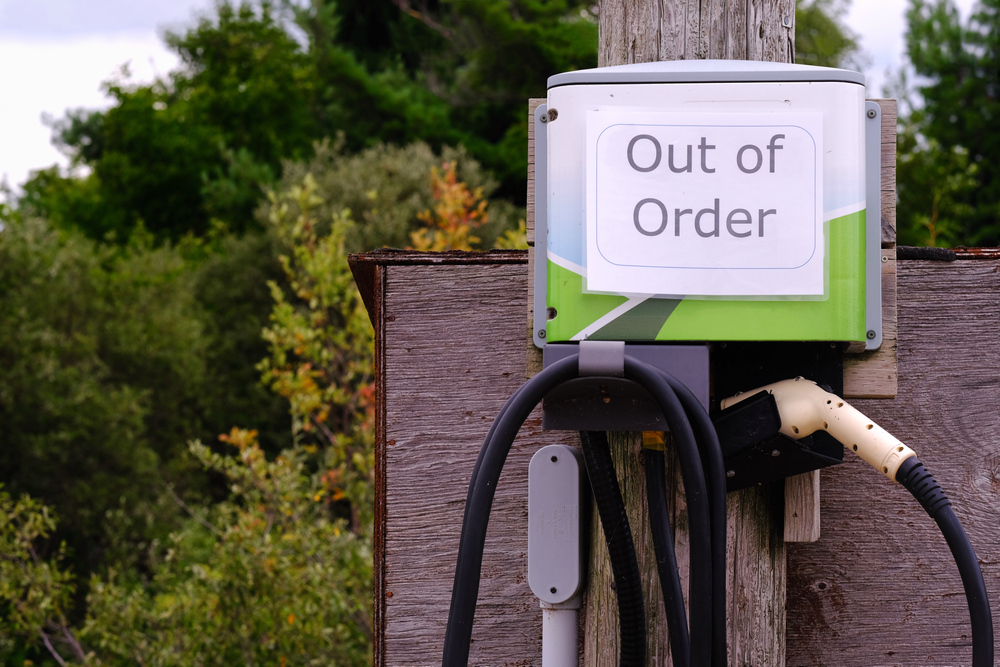The Town of Beacon Falls’ electric vehicle (EV) charging stations are currently out of order and “no longer available for public use until further notice” at a local commuter lot, according to a Sept. 29 notice.
As fate would have it, the same day, the Department of Energy and Environmental Protection (DEEP) proposed that the state “adopt the California light-duty new vehicle emissions standards,” banning the sale of new gas-powered cars in Connecticut by 2035.
In the new proposed regulation, DEEP argues, “Adopting these new standards will reduce emissions from covered vehicles, the largest contributor to emissions of greenhouse gases and nitrogen oxides (NOx), a precursor to ground level ozone, and move Connecticut closer towards meeting state climate change goals set forth in section 22a-200a of the general statutes.”
DEEP’s decision, however, was anticipated after the agency proposed similar emissions standards on medium to heavy-duty vehicles on July 21.
While public comments submitted between July 21and Aug. 22 questioned whether Connecticut should even embrace California’s standards, the agency responded that its intent is “to adopt the best policies available to meet the public health needs of Connecticut,” adding, “To that end it is important to understand the national structure for regulating vehicle emissions.”
Similarly, opponents of the potential ban argued that adopting another state’s regulations could plunge Connecticut into a legal quagmire. Yet DEEP assured the public that there is “no legal conflict,” pointing to other states like New York, Vermont, Massachusetts, Colorado, Washington and Oregon adopting the emission standards that Connecticut is proposing. However, this contradicts then-Att. Gen. Richard Blumenthal’s comments to lawmakers prior to the General Assembly’s vote to adopt the Golden State’s emissions standards in 2004. He said, “I don’t think that we’re committed to follow California provision by provision,” and that “We would not be bound by every change made by California.”
DEEP acknowledged there are certainly “higher upfront costs” of switching to EVs, but suggested “there are potential long-term savings on fuel and maintenance when considering total cost of ownership.” While DEEP’s prognosticators anticipate prices to decline over time, as of July 2023, EVs cost on average $53,469, while gas-powered vehicles amount to $48,334, according to Kelley Blue Book. Additionally, EV batteries are “costly to replace out of pocket” ranging between $4,000 to $20,000, as stated by J.D. Power; and the Financial Times predicts that EVs will be 9% more expensive than combustion vehicles by 2030.
As for impact on the state’s financial well-being, the new proposed regulation’s fiscal note found that revenues (minus costs) will increase by $12.59 million in the first two years of implementation, followed by “a cumulative decrease of $85.11 million over the regulatory horizon.” As the report states:
Displacing gasoline fuel with electricity will decrease the amount of gasoline dispensed in the State, resulting in a reduction of tax revenue collected by local governments. Theses [sic] revenues, particularly those from state gasoline taxes and registration fees, are used to fund transportation projects across the state including road maintenance, construction of state highways and local streets, transit facilities and operation, and active transportation projects.
Meanwhile, members of the public questioned the speed at which DEEP is proposing to implement the ban on gas-powered vehicles, suggesting Connecticut’s infrastructure is not prepared to handle the load. In response, the agency stated that the “distribution grid is constantly evolving to meet energy demands” and expects the “local electric distribution companies to meet their responsibilities to maintain and upgrade the local distribution system as necessary to avoid any negative impacts resulting from increasing electric demand.”
As for the impact on reversing climate change trends? According to DEEP, Connecticut’s transportation sector comprises all of an estimated 0.04% of global carbon emissions — meaning the agency’s new proposed bans on gas-powered vehicles will have an “undetectable effect,” according to Yankee Institute’s research. Additionally, the state is unlikely to maintain its level of financial support for EVs, since federal money that buoyed state budgets in recent years will eventually dry up.
Currently, residents pay exorbitant amounts for electricity, as Connecticut ranks among the worst in the nation. Laying this additional gargantuan financial burden for little-to-impact on the carbon emissions the state aims to reduce, all the while restricting choice in the marketplace, does not spell a recipe for long-term success — which Connecticut’s outlook is grim, ranking 49th out of 50 in Truth in Accounting’s 2022 Fiscal Health rankings, largely due to enormous unfunded retirement obligations.
Plus, the Beacon Falls EV charging stations being out of commission — the same day DEEP officially proposed the gas-powered car ban — simply is not a good omen.

